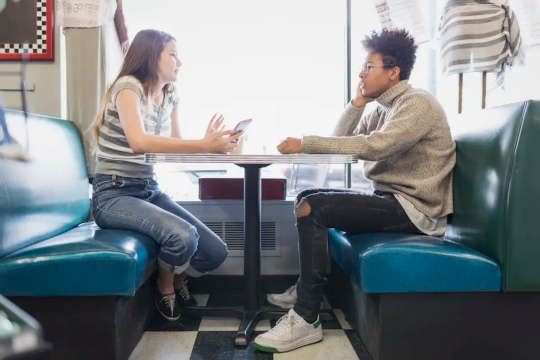
Friends of more secure teens were more comfortable asking for help in their conversations. Tony Anderson/Stone via Getty Images
Teens with more secure family relationships get a head start on developing empathy, according to my colleagues’ and my new study tracking adolescents into adulthood.
In contrast to popular myths about self-obsessed teens, existing research shows that adolescence is a key stage of development for the growth of empathy: the ability to stand in someone else’s shoes, to understand and resonate with their emotions and to care about their well-being. Empathy is a skill that develops over time, and it has major consequences for teens’ social interactions, friendships and adult relationships.
So how do teens learn this critical skill?
Our team’s new findings, published on July 15, 2021, in the journal Child Development, suggest that teens who have secure, supportive family relationships provide more empathetic support to their friends.
Imagine yourself as a teenager with someone in your life who understands your struggles, offers help and makes you feel supported and connected – that’s what empathetic support is all about.
Our study, led by professor of psychology Joseph P. Allen, followed 184 adolescents from their early teens into adulthood. When teens were 14 years old, we interviewed them about their family experiences and their relationships with their parents.
The interviews were designed to measure attachment security – teens’ confidence that they can explore and build autonomy while trusting others to provide connection, safety and support when they need it. Past research shows that experiences of receiving sensitive care from adult caregivers, especially in times of stress, build secure attachment. In each interview, we rated teens as secure if they expressed that they valued their family relationships and described them in a balanced, clear way.
Then we videotaped the teens at ages 16, 17 and 18, while they helped their closest friend talk through problems they were facing. From these videos, we quantified how much support friends sought from the teens we interviewed – for example, by asking for their opinion on a situation. To measure how much empathetic support the teens provided, we looked for four types of behaviors: showing understanding, helping friends solve their problems, providing emotional validation and actively engaging in conversations.
We found that teens who were more secure in their family relationships at age 14 provided more empathetic support to their friends in early adolescence and showed consistently high empathy over time. Teens who were less secure showed lower levels of empathy at first but improved this skill over time and nearly caught up to more secure teens by age 18.
This finding suggests that teens naturally gain empathetic skills as they get older, but those with more secure family relationships may get there faster.
What is especially interesting is that teens’ friends were more likely to seek out support from secure teens, and friends who sought more help were more likely to receive it. Thus, friendships provide a key context for adolescents to practice giving and receiving empathetic support.
Why it matters
Teens who are more empathetic are less aggressive, exhibit less prejudice and are less likely to bully others.
Our research suggests that empathy starts with feeling safe and connected. Building secure relationships, characterized by trust, emotional safety and responsiveness, can give teens a firsthand experience of empathy. With this foundation in place, they can then share that empathy with others.
What’s next
There’s still plenty we don’t know about teens’ empathy. For instance, what equips teens to empathize with individuals from marginalized groups, with new peers or dating partners, or with their own future children?
Learning how to nurture empathy in adolescence is vital for building a more compassionate society.
About The Author

Related Books:
The Five Love Languages: The Secret to Love That Lasts
by Gary Chapman
This book explores the concept of "love languages," or the ways in which individuals give and receive love, and offers advice for building strong relationships based on mutual understanding and respect.
Click for more info or to order
The Seven Principles for Making Marriage Work: A Practical Guide from the Country's Foremost Relationship Expert
by John M. Gottman and Nan Silver
The authors, leading relationship experts, offer advice for building a successful marriage based on research and practice, including tips for communication, conflict resolution, and emotional connection.
Click for more info or to order
Come as You Are: The Surprising New Science that Will Transform Your Sex Life
by Emily Nagoski
This book explores the science of sexual desire and offers insights and strategies for enhancing sexual pleasure and connection in relationships.
Click for more info or to order
Attached: The New Science of Adult Attachment and How It Can Help You Find—and Keep—Love
by Amir Levine and Rachel Heller
This book explores the science of adult attachment and offers insights and strategies for building healthy and fulfilling relationships.
Click for more info or to order
The Relationship Cure: A 5 Step Guide to Strengthening Your Marriage, Family, and Friendships
by John M. Gottman
The author, a leading relationship expert, offers a 5-step guide for building stronger and more meaningful relationships with loved ones, based on principles of emotional connection and empathy.
Click for more info or to order
This article originally appeared on The Conversation
























